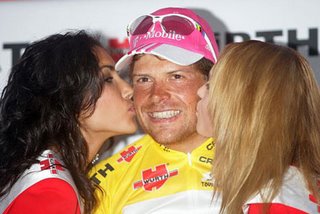Never mind the superhuman strength and endurance needed to race a bike almost 4,000 kilometres around France. Ignore the mountain stages that require riders to grind up treacherously steep roads in oppressive heat. The Tour is so much more than that.
It’s not just physically grueling, it’s mentally demanding. The riders are always thinking two moves ahead of their opponents. It’s like a giant game of chess played on bicycles at warp speed. And it all gets underway in less than a week!
I am predicting right now, right here, that the 2006 Tour will go down in history as one of the most exciting races on record. Why? Because Lance Armstrong isn’t competing this year and it’s anyone’s race. Well, maybe not anyone’s race. I have a feeling my boyfriend Jan Ullrich is going to be the one standing on top of the podium wearing the yellow jersey when it’s all over.
This is Ullrich’s year. And I’m not just saying that because I think he’s hot. The man is on fire. He won the Tour of Switzerland last week. In May, he won a critical time trial at the Giro d’Italia. He has won the Tour de France once before (in 1997) and would have won it four more times if Lance Armstrong hadn’t gotten in his way.
There are so many reasons why I love this race. It’s not just about who gets from Point A to Point B the fastest. It’s also about everything that happens in between.
The race is unpredictable and its riders are at the mercy of the elements. There could be a torrential downpour one day and a heat wave the next. There could be strong winds in the morning and hail in the afternoon. One slip by a single cyclist on a wet cobblestone road could cause a massive crash as riders behind him fall like dominoes. Someone breaks a bone and his race is over.
There is something different every day. Some of the stages are short. Some are long. There are flat stages. There are team time trials. There are individual time trials.
And then there are mountain stages, which are the most thrilling stages of all. There is nothing like watching the riders grind up the side of a mountain, their faces twisted in pain, sweat dripping off their chins. It is the purest manifestation of agony and determination you will ever see.
Of course, what goes up must come down. The descents are ridiculously dangerous. The riders fly down the mountain at speeds of up to 80 kilometres an hour on tires barely an inch wide.
Even watching the spectators is entertaining. Sometimes the spectators are abusive towards the riders. Most of the time, they’re just crazy. They jump in front of the riders as they’re coming down the road and wave and scream at them until they’re almost mowed down. On the mountain stages, they’ll run on the road behind the riders, giving them a push. They are almost always just a few inches away from the riders, which can be harrowing. In 2003, Lance Armstrong crashed after his handlebars got hooked on a spectator’s bag strap.
Even though the fans may be unruly, cycling is a civilized sport. There’s an unwritten code of conduct. You don’t attack a leading rider when they have a mechanical breakdown. When the leading rider crashes, you wait for him to get back on the bike. You don’t hip-check and punch one another. You stop racing and jump off your bike to pee on the side of the road at the same time everyone else does. You’d never see that kind of gentlemanly behaviour in hockey.
Of course, it’s impossible to talk about the Tour de France without mentioning the doping scandals that plague the race. Yes, lots of riders are hopped up on EPO, growth hormones and amphetamines. And, yes, cheating is wrong. But if the majority of the riders are using performance-enhancing drugs, it creates a level playing field. (It would be preferable to have a level playing field where none of the riders were using steroids but that’s not going to happen until the International Cycling Union creates stronger anti-doping policies along with newer, better and more frequent testing.)
Doping scandals aside, the Tour is worth watching for the eye candy alone. Hundreds of young guys in top physical shape wearing spandex. The sheer beauty of watching the peloton snake its way through the French countryside. The machine-like efficiency of the team time trials. Watching the sprints and the breakaways, and then watching the field swallow them back up again.
I’m giddy just thinking about it. Go, Jan, go!


No comments:
Post a Comment